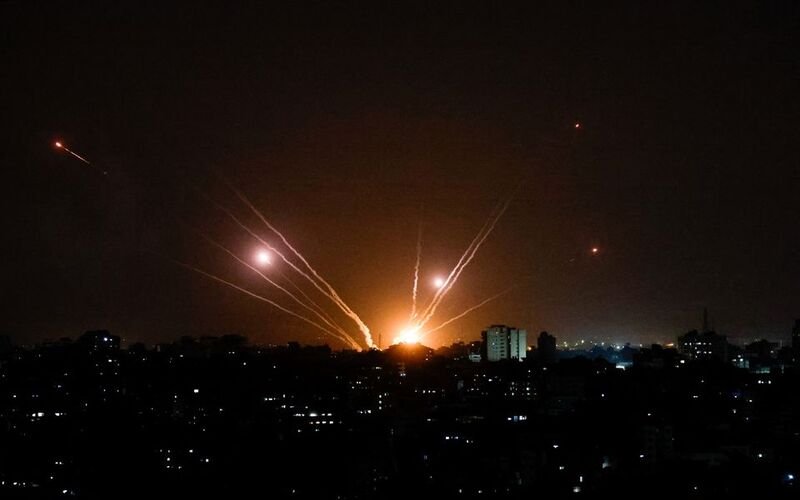Hamas’s assault on Israel shows surprise is still possible in the AI era. Israeli authorities sent the head of NATO’s military council to the Gaza border on September 27, only a few days before Hamas fighters launched the biggest surprise attack on Israel since the Yom Kippur War of 1973, to show off their use of artificial intelligence and sophisticated monitoring.
Israeli officials have said that they will use this technology in their final big conflict in Gaza in 2021, and its greatest A.I. and newest drones will likely once more aid in the selection and destruction of targets in the region. However, the failure of those technologies to provide early notice of the Hamas attack on Saturday is an intelligence failure that will probably be examined and debated for years.
Hundreds of Palestinians were murdered in retaliatory strikes on Gaza, and 700 Israelis have also been reported dead, making the scope of the events over the weekend only just becoming evident.
The magnitude of Hamas rocket attacks at times exceeded Israel’s powerful Iron Dome defenses, and several forward Israeli military posts and villages close to Gaza were overrun, often seemingly without any or little notice. The intelligence services of the United States and its allies, who had earlier praised themselves for foreseeing Russia’s invasion of Ukraine in February 2022, now seem to have been caught off guard. They will probably also reflect on what occurred to learn from it and prevent a repeat of it with the prospective war that is now worrying Washington the most: any Chinese invasion of Taiwan.
On condition of anonymity, a former Western intelligence officer stated, “There will have been warning signs.” It is evident that Hamas would accomplish this without leaving a data trail or that the clues were present but were not deciphered from the data. Israeli monitoring of Gaza is regarded by many as being among the most intensive and sophisticated measures ever, ranging from border checkpoints and electronic eavesdropping on communications to drones using facial recognition software.
A NATO statement claims that Dutch Admiral Robert Bauer visited Israel last month to benefit from the local Gaza Division’s knowledge and “seek out innovative military capabilities.”
Israeli Defence Ministry Director General Eyal Zamir said in May that Israel was on the verge of developing into a “superpower” of artificial intelligence thanks to touch tools for decision-making and analysis.
The past weekend’s events indicate that Israeli officials were already overconfident in such skills. That may serve as a cautionary tale for other governments that are leaning more and more toward artificial intelligence contractors who promise to be able to provide sharp analysis and early warning.
Such methods may be extremely helpful for synthesizing massive amounts of data, especially in technical fields like sonar or radar. However, they are only as good as the information given, and it is rarely easy to understand human behavior in a crowded metropolitan setting like Gaza.
Israeli officials maintain that any resulting civilian casualties are still Hamas’ responsibility; the ongoing air and possibly upcoming ground offensive into Gaza will be seen as an opportunity to exact revenge for the attack while reasserting the reputation of the Israeli security state and high-tech industry that supports it.
Israeli officials claim they had used increasingly accurate information and strikes in their past wars and operations in Gaza. Yet, their 2021 attacks nevertheless claimed the lives of about 350 Palestinians. The existing targets have probably been compiled over many months and years.
SURVIVING IN OPEN SIGHT?
The circumstances in the Gaza Strip, where Hamas took control in 2007 and w.3 million Palestinians are confined behind a 51-km fence, will have aided Hamas in hiding their attack. The fact that Gaza is heavily inhabited and built up will have made it easier for Hamas to deploy machinery, like bulldozers, near enough to the walled border to be utilized quickly—likely without utilizing communications that may be watched.
It’s unknown how much commanders informed militants about the impending assault, but considering Israel’s history of using human sources, Hamas officials may have kept their plans very well guarded.
For surprised Israeli soldiers and residents living near the Gaza border, even a notice of a few hours or minutes may have made a difference. Due to the religious holiday of Sukkot and prior training, including that of militants using paragliders, it’s possible that the closing moments before the assault, when movements might have been observed more easily, were missed.
What other countries and their proxies may have known beforehand is the other important question, both for Israel and the rest of the globe. Former Israeli military spokesperson Jacob Dallal writes this weekend in the Times of Israel that Israeli intelligence this autumn felt a strike by Iranian-backed Hezbollah conducted from Lebanon posed a significantly higher threat.
Israel may still be concerned that the Hamas attack from Gaza may lead to that. On Sunday, Hezbollah claimed that it had “in solidarity” with the Palestinian people, fired missiles and artillery at three places in Israel. Israel is probably now less trusting of Egypt, which had promised to protect its Gaza border, and Qatar, home to a Hamas political headquarters, and facilitated an agreement between the two parties to restore the Israel-Gaza crossings at the end of September following a two-week closure.
Those two countries might still be among the greatest options for discussion as Israel moves to free the prisoners. However, given the rumors that several Americans and other foreign nationals may also have been slain or abducted, Hamas may soon find itself the target of U.S. and maybe wider military action, along with all the intelligence resources that go along with it.
COMPLEX LOCAL RELATIONSHIPS
The Al Aqsa mosque in Jerusalem, the site of escalating conflict between Jewish religious nationalists and Palestinian demonstrators, was the target of Hamas’ weekend operation, which it said was an attempt to “liberate” the mosque. They appear to be doing this to capitalize on the already-present, broad regional hostility toward Israel and, more specifically, the administration of Prime Minister Benjamin Netanyahu.
This might make an upcoming agreement between Saudi Arabia and Israel that was brokered by the United States more difficult. It would build on a similar agreement with the United Arab Emirates. Iran would gain by blocking it. Israeli suspicions that Iran was personally engaged in the weekend assault will grow due to immediate remarks from Tehran endorsing Hamas operations and what Israel claims is a long-running campaign to supply weapons to both groups.
The border between Israel and Syria is erratic and, in some places, under the authority of the Islamic State. The same is true of the situation in Syria, where Iran, China, and Russia have all subtly increased their backing for the Assad regime. Other forces are still present in Syria, and last week, the U.S. took the rare action of shooting down a Turkish drone that threatened its troops and Kurdish friends.
All indications point to a worsening of regional dynamics after the invasion of Ukraine. Officials from the United States and other Western nations have pressured Israel to cut its links with Russia. They have mostly succeeded in getting the government and its tech companies to stop secretly deepening their financial ties with China. According to Mossad head David Barnea, who spoke at a conference last month, Israel was concerned that Russia might provide Iran with cutting-edge weapons in exchange for crucial drones. Leaders of Hamas claimed to have visited Russian Foreign Minister Sergey Lavrov in Moscow earlier this year.
Russia has reiterated its support for a Palestinian state independent of Israel and called for a cease-fire since the Hamas attack; Israeli officials have explicitly criticized China for failing to denounce Hamas.
It would have been a significant and maybe improbable danger if Moscow or Beijing had actively urged Hamas to take the moves it has this week, even indirectly through Iran. However, authorities in both capitals will consistently monitor events and take away any lessons they can for their ongoing and upcoming conflicts.


































Comment Template